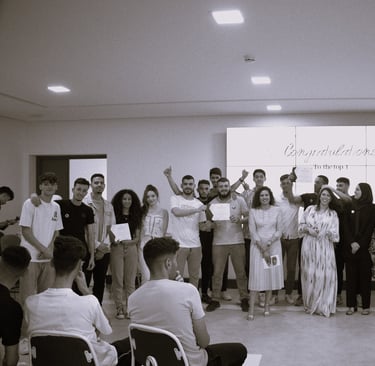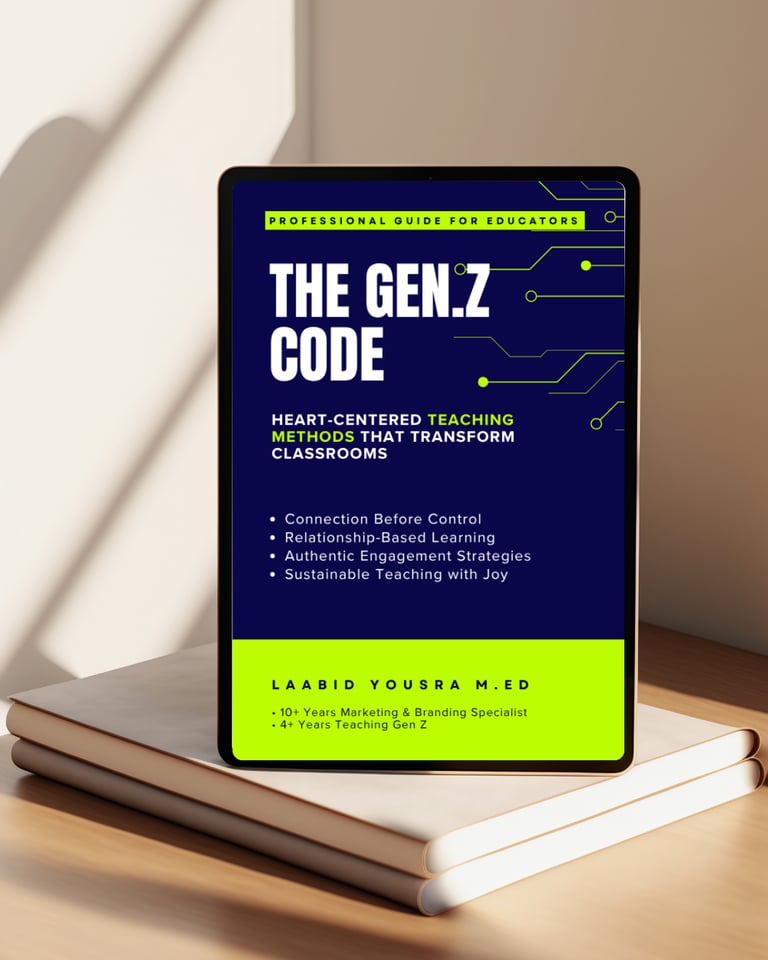Decoding Gen Z: Why Traditional Classroom Management Fails and What Actually Works
Discover evidence-based strategies for teaching Gen Z students effectively. Learn why traditional classroom management fails and explore heart-centered approaches that build authentic connections, increase engagement, and transform learning outcomes for digital natives.
IN A TEACHER'S APRON
Laabid Yousra
9/21/20255 min temps de lecture


The Heart of the Problem: Connection Before Control
The most significant barrier between educators and Gen Z isn't technology or attention spans—it's the outdated belief that respect must be earned through authority rather than authentic relationship. Gen Z students have grown up in a world where information is democratized, voices are amplified through social media, and authenticity is valued above all else. They can spot performative behavior instantly and will disengage from teachers who prioritize control over connection.
Understanding the Gen Z Emotional Landscape
This generation carries unique psychological burdens that previous generations didn't face in their formative years:
Constant Global Awareness: They've witnessed climate disasters, social injustice, pandemics, and economic uncertainty unfold in real-time through their screens since childhood. This creates a heightened emotional sensitivity and anxiety about the future.
Information Overload: They process massive amounts of information daily and have developed sophisticated filtering mechanisms. If your content doesn't immediately demonstrate relevance to their lives, they'll mentally tune out.
Authenticity Radar: Having grown up with influencer culture and marketing saturation, they're exceptionally skilled at detecting when adults are being genuine versus when they're "performing" their role.
The Five Core Needs Every Gen Z Student Brings to Your Classroom
1. Individual Recognition
They're tired of being discussed as a monolithic generation. Each student wants to be known for their unique perspectives, challenges, and aspirations. This means learning names quickly, remembering personal details they share, and seeing each student as a complete human with their own story.
2. Emotional Validation
When Gen Z students express stress, anxiety, or overwhelm, they're not being dramatic—they're responding authentically to a complex world. Phrases like "That sounds really challenging" or "Your feelings make complete sense" build trust and psychological safety.
3. Agency in Learning
Having grown up with choice in every aspect of their digital lives, passive learning feels unnatural. They need opportunities to co-create their educational experience, choose how they demonstrate understanding, and have input in classroom decisions.
4. Purpose-Driven Education
Every lesson must answer the question: "How does this help me become who I want to be?" They don't just want jobs—they want missions. They don't just want success—they want significance.
5. Hope for the Future
Underneath their anxiety lies a deep desire to believe their education is preparing them for a future worth creating. They need to see how their learning connects to positive change in the world.
Practical Strategies That Transform Classroom Dynamics
Start with Micro-Moments
Instead of grand gestures, focus on brief but meaningful interactions throughout each day. A genuine smile when they enter, remembering something they mentioned yesterday, or acknowledging specific effort can shift the entire classroom atmosphere.
Implement the "Wisdom Flip"
Position students as experts in areas where they have more knowledge than you—social media, current technology, or perspectives on contemporary issues. This validates their intelligence while creating collaborative learning opportunities.
Practice Vulnerable Leadership
Share your own learning struggles, admit when you don't know something, and model how you handle mistakes. Gen Z responds to authenticity over perfection and will trust teachers who show their humanity.
Create Choice Within Structure
Offer multiple ways to demonstrate learning—video presentations, creative projects, traditional essays, or collaborative work. This honors their need for agency while maintaining academic rigor.
Connect Every Lesson to Real Impact
Begin each unit by showing how the skills or knowledge can be used to address issues they care about. Whether it's using math to analyze social justice data or applying writing skills to advocacy, make the connection explicit.
Technology as a Bridge, Not a Barrier
Rather than competing with technology, use it to deepen human connections. Video feedback feels more personal than written comments. Collaborative digital platforms can amplify quiet voices. Social media literacy becomes a critical thinking exercise rather than a distraction to manage.
The key is ensuring every technological tool serves the purpose of enhancing relationship and learning, not replacing human interaction.
The Sustainability Factor
Heart-centered teaching with Gen Z requires setting healthy boundaries to prevent burnout. This generation's emotional needs are significant, but teachers must remember they're educators, not therapists. You can care deeply without taking responsibility for fixing all their problems.
Create support networks with colleagues who share similar values, maintain relationships outside of work, and remember that your authentic care—even when imperfect—makes a profound difference.
Measuring Success Beyond Scores
True transformation shows up in increased willingness to take intellectual risks, greater empathy for peers, improved emotional regulation, and stronger sense of personal purpose. Document these changes alongside academic progress to maintain perspective on what really matters.
Students who feel genuinely seen and valued in school carry that experience forward, treating others with greater kindness, approaching challenges with more resilience, and believing in their ability to create positive change.
The Ripple Effect
When educators embrace heart-centered approaches with Gen Z, the impact extends far beyond individual classrooms. These students become more empathetic community members, more resilient problem-solvers, and more hopeful change-makers. In a world facing complex challenges, developing these human qualities alongside academic skills isn't just beneficial—it's essential.
The choice is clear: continue struggling with outdated methods that treat symptoms rather than causes, or embrace an approach that honors both the teacher's humanity and the student's complexity. Gen Z isn't broken and doesn't need to be fixed. They need educators who understand that relationship isn't separate from rigor—it's the foundation that makes meaningful learning possible.
Your teaching heart, combined with practical strategies that honor how this generation actually thinks and feels, is exactly what they've been waiting for.
Are you struggling to connect with your Gen Z students? Finding that time-tested teaching methods fall flat with this generation? You're not alone. The digital natives born between 1997-2012 represent a fundamental shift in how young people learn, communicate, and engage with the world—and traditional educational approaches often miss the mark entirely.
Traditional teaching methods are failing with Gen Z students, leaving educators frustrated and students disengaged. This comprehensive guide reveals why authority-based classroom management doesn't work with digital natives and provides evidence-based strategies that do.
Drawing from educational psychology and real classroom experience, learn how to build authentic relationships that transform learning outcomes. Discover the five core emotional needs driving Gen Z behavior, practical micro-strategies for daily implementation, and sustainable approaches that prevent teacher burnout while maximizing student growth.
Whether you're a veteran educator seeking fresh approaches or new to teaching this unique generation, these insights will help you move from struggling with Gen Z to successfully connecting with and inspiring them.
Your Next Step!
If these insights resonated with you, if you found yourself nodding along and thinking "this is exactly what my students need," then you're ready for the complete transformation framework.
"The Gen Z Code: Professional Guide for Educators" provides the detailed roadmap for implementing these heart-centered approaches. Written by someone who lived this transformation firsthand, it offers:
20 specific classroom strategies with real implementation examples
Daily practices for building authentic relationships without burnout
Communication scripts for difficult conversations
Technology integration that enhances rather than disrupts connection
Your students are waiting for a teacher who truly sees them. You already have everything you need—your caring heart and genuine desire to make a difference.
The guide simply shows you how to use these gifts effectively with the generation that needs them most.
Ready to stop struggling and start connecting? Get the complete framework that turns these insights into daily classroom transformation.




